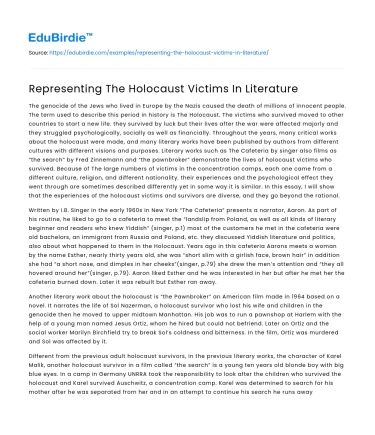Introduction
The Holocaust, an unprecedented atrocity in human history, has been a profound subject for literary exploration. Literature serves as a critical medium to memorialize the victims and bear witness to the horrors they endured. Holocaust literature encompasses a wide array of narratives, ranging from personal memoirs to fictional accounts, each contributing a unique perspective on the victims' experiences. This genre not only seeks to preserve the memory of those who perished but also to educate future generations about the catastrophic consequences of hatred and intolerance. However, representing the Holocaust in literature presents complex challenges, including ethical considerations, the balance between fact and fiction, and the impact of narrative structure. This essay explores these complexities and the ways in which literature attempts to faithfully represent Holocaust victims while confronting the inherent limitations of such representations.
Authenticity and Ethical Considerations
Authenticity is a central concern in Holocaust literature, as authors must navigate the delicate task of accurately portraying the suffering of victims without trivializing their experiences. This often involves a meticulous adherence to historical facts. For example, Elie Wiesel's seminal work, "Night," is a memoir that details his own harrowing experiences in Auschwitz and Buchenwald. Wiesel's narrative is a poignant example of how personal testimony can provide a visceral, authentic insight into the Holocaust, grounding the reader in the stark reality of the events described. However, the emphasis on authenticity raises ethical questions about who is entitled to tell these stories. Critics argue that fictionalization risks distorting the truth and potentially disrespecting the victims. As Lawrence L. Langer notes in his book "Holocaust Testimonies: The Ruins of Memory," the act of fictionalizing Holocaust narratives can lead to a "betrayal of memory," where the focus shifts from the victims' authentic experiences to the author's creative liberties.
Save your time!
We can take care of your essay
- Proper editing and formatting
- Free revision, title page, and bibliography
- Flexible prices and money-back guarantee
Transitioning from the debate over authenticity, it is crucial to examine how literature can still honor the memory of Holocaust victims while engaging with fictional elements. Some argue that imaginative narratives can potentially reach wider audiences, thus amplifying the educational impact. Indeed, fictional works like Art Spiegelman's "Maus," which uses graphic novel format and anthropomorphized characters, have successfully conveyed the emotional depth of Holocaust experiences to readers who might not engage with traditional historical texts. This highlights the tension between maintaining factual accuracy and utilizing creative storytelling techniques to resonate with diverse audiences.
The Role of Narrative Structure
The narrative structure in Holocaust literature significantly influences how readers perceive and understand the victims' experiences. Different narrative techniques can evoke varying emotional responses, shaping the reader’s engagement with the text. For instance, Primo Levi's "If This Is a Man" employs a straightforward, chronological narrative that immerses the reader in the daily realities of concentration camp life. Levi's use of a dispassionate, almost clinical tone underscores the dehumanization suffered by the victims, reinforcing the gravity of the events described. In contrast, fragmented narratives, such as those found in Charlotte Delbo's "Auschwitz and After," reflect the disorientation and psychological trauma experienced by survivors. Through non-linear storytelling, Delbo captures the enduring impact of the Holocaust on survivors' lives, emphasizing how the past perpetually intrudes upon the present.
The transition from examining narrative structures to considering the broader impact of these techniques on public memory highlights the powerful role literature plays in shaping collective understanding of the Holocaust. While chronological narratives may offer a clear, factual recounting of events, more experimental structures can evoke empathy and a deeper emotional connection, fostering a more profound understanding of the victims' experiences. This raises questions about the responsibilities of authors in choosing narrative techniques that best honor the memory of Holocaust victims while engaging readers in meaningful reflection.
Preservation of Memory and Future Implications
As Holocaust survivors age and their numbers dwindle, literature becomes an increasingly vital tool for preserving their stories. The written word offers a permanence that oral testimonies cannot, ensuring that the voices of victims endure for future generations. However, as literature assumes this role, it must also address potential criticisms regarding the commodification of suffering. Critics like Alvin H. Rosenfeld have warned against the "Americanization" of the Holocaust, where narratives are simplified or sensationalized to cater to popular culture. This raises important considerations about the integrity and educational value of Holocaust literature.
Transitioning to the conclusion, it is essential to acknowledge the balance required in representing Holocaust victims in literature. While literature serves as a powerful vehicle for memory preservation, it must continually strive to respect the dignity of those it seeks to honor. By navigating the complexities of authenticity, narrative structure, and ethical representation, literature can continue to play a pivotal role in ensuring the Holocaust is neither forgotten nor misrepresented.
Conclusion
In conclusion, representing Holocaust victims in literature is a multifaceted endeavor that demands sensitivity, accuracy, and ethical consideration. Through a careful balance of factual authenticity and creative expression, literature has the potential to both preserve the memory of those who suffered and educate future generations about the perils of intolerance. While challenges remain, particularly in maintaining the integrity of these narratives amidst changing cultural landscapes, literature's role in Holocaust remembrance is indispensable. As we move further from the events of the Holocaust, the responsibility of authors and readers alike is to engage with these texts thoughtfully and critically, ensuring that the stories of the victims continue to resonate with power and purpose. Ultimately, Holocaust literature not only memorializes the past but also serves as a poignant reminder of the enduring need for empathy, understanding, and vigilance against hatred.






 Stuck on your essay?
Stuck on your essay?

